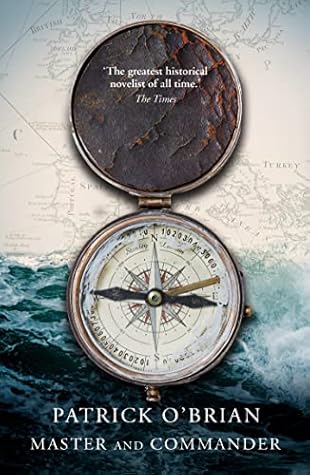More on this book
Community
Kindle Notes & Highlights
The last trial and the sentence had been quite shockingly painful.
Keats, Hood, Brenton, Grenville he knew: was Grenville winking at him with his one eye, or was it an involuntary blink?
We have met all these
Keats
Grenville (one eyed)
Hood (famous admiral)
Jaleel Brenton - friend of Thomas Cochrane. Also given to an officious American who questions Jack in Fortuneof War.
The president looked twenty years younger since the victory, but still his face was impassive and there was no distinguishing the expression of his eyes, behind those drooping lids.
One, a left-handed man, was drawing – scribbling. Jack’s eyes g...
This highlight has been truncated due to consecutive passage length restrictions.
‘That man loves his trade,’ thought Stephen. ‘But what a wretched voice.
Gabble, a professional deformation in lawyers.’ And he was reflecting on industrial disease, on the corrosive effects of righteousness in judges, when he noticed that Jack had relaxed from his first rigid posture:
He was looking sullen, oddly still and dangerous; the slight lowering of his head and the dogged way in which he stuck out his feet made a singular contrast with the perfection of his uniform, and Stephen had a str...
This highlight has been truncated due to consecutive passage length restrictions.
a harsh, God-damn-you voice, as though he were addressing a most inimical body of men
Then, though he was conscious of the singular ineptitude of this speech, he shut his mouth tight and stood looking straight ahead of him, while the clerk’s pen squeaked nimbly after his words, writing ‘and cut several of the ropes’. Here there was a slight pause, in which the president glanced left and right and coughed again before speaking. The clerk drew a quick flourish after ropes and hurried on:
Question by the court Captain Aubrey, have you any reason to find fault with any of your officers or ship’s company? Answer No. The utmost endeavour was used by every person on board. Question by the court Officers and ship’s company of the Sophie, have any of you reason to find fault with the conduct of your captain? Answer No.
while from the one side the distant shrieking of the parson echoed up from the cockpit (he had made a determined attempt at suicide) and from the other the drone of the trial went on. They were all deeply affected by Jack’s concern, anxiety and rage: they had seen him unmoved so often and in such circumstances that his present emotion shook them profoundly, and disturbed their judgment.
‘This is an entirely irrational fear,’ said Stephen Maturin, looking at his wet and clammy palm. ‘It is but one more instance of the … for surely to God, surely for all love, if they had wished to sink him they would have asked “How came you to be there?”? But then I know very little of nautical affairs.’ He looked for comfort at the master’s face, but he found none there.
Question: Did she gain on the Sophie without her studdingsails set? Answer: Yes. Question by the court: Did they seem to sail much faster than you? Answer: Yes, both by and large. Dr Maturin, surgeon of the Sophie, called and sworn. Question by the court: Is the statement you heard made by your captain respecting the loss of the Sophie, correct as far as your observation went? Answer: I think it is. Question by the court: Are you a sufficient judge of nautical affairs to know whether every effort was used to escape from the force that was pursuing the Sophie? Answer: I know very little of
...more
They filed in, and in spite of all his years at sea Jack forgot to duck: he struck the lintel of the door with a force that left a patch of yellow hair and scalp on the wood and he walked on, almost blinded, to stand rigidly by his chair.
the court is of the opinion that Captain Aubrey, his officers and ship’s company used every possible exertion to prevent the King’s sloop from falling into the hands of the enemy: and do therefore honourably acquit them. And they are hereby acquitted accordingly,’ said the judge-advocate, and Jack heard none of it.
Jack’s clearing eyes caught Keats’ smile, saw Captain Stirling pick up that familiar, rather shabby sword, holding it with its hilt towards him, while with his left hand he smoothed a piece of paper by the inkwell.
‘Captain Aubrey: it is no small pleasure to me to receive the commands of the court I have the honour to preside at, that in delivering to you your sword, I should congratulate you upon its being restored by both friend and foe alike; hoping ere long you will be called upon to draw it once more in the honourable defence of your country.’


